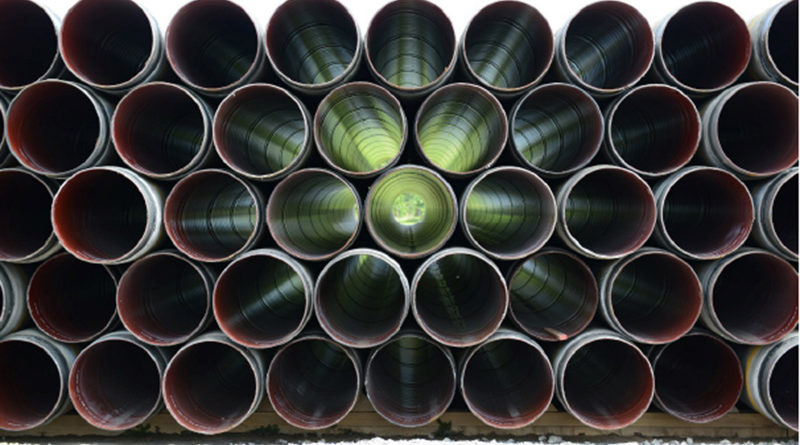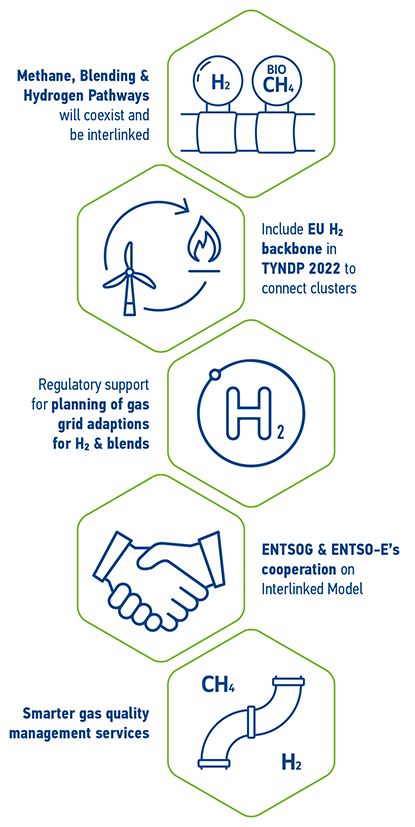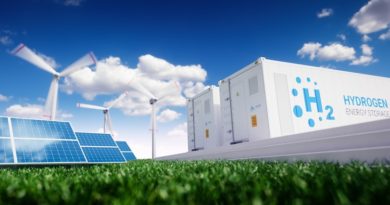
Hydrogen’s role to decarbonise the European gas grid
Gas TSOs will have an important role to play in supporting the upscale of the hydrogen economy – in creating the open access to grids, connecting the supply and demand dots, and by sharing European gas Transmission System Operators’ (TSOs) experience in markets organisation. The challenge today is not that the individual technologies are not proven and ready, but that they need to be scaled-up in order to offer cost-effective climate benefits.
ENTSOG (European Network of Transmission System Operators for Gas) recognises the changing infrastructure needs for transporting increasing volumes of renewable, decarbonised and low-carbon gases, such as hydrogen and biomethane. Robust, timely and effective adaptation to meet the needs of the changing landscape of the European energy market allows for the cost-efficient and cost-effective decarbonisation of Europe’s gas grids. It will facilitate the meeting of the EU Green Deal commitments and address the post COVID-19 recovery plan for a green economy. Existing gas infrastructures will be an important accelerator for this.
Building the EU’s future gas network should start already now if we reasonably expect it to be completed for 2050. The EU already has a well-established and trusted planning process for network development, based on the TYNDP process, which should be used for the future development of the grid.
TYNDP 2022 could identify the initial ‘no-regrets’ backbone of retrofitted or repurposed gas infrastructure and prepare for its gradual expansion. Updated CBA methodology evaluation criteria could include digitalisation of measuring and data handling, and energy storage and flexibility from all technologies. The upcoming TEN-E revision should account for the new hydrogen market and deliver this first stage ‘no regrets’ backbone.
In ENTSwOG’s ‘2050 Roadmap for Gas Grids’ – published in December 2019 – the European gas TSOs makes practical recommendations on how to effectively combine well-functioning, liquid gas markets and established security of gas supply, with the commitment to reach decarbonisation goals. In light of the European Commission’s Energy System Integration and Hydrogen Strategies, ENTSOG proposed the 2050 Roadmap Action Plan. The Action Plan indicates how a hybrid, dual gas quality system with biomethane and hydrogen molecules could coexist and form the early stages of the hydrogen economy. The hydrogen market could be composed of several clusters (until more mature markets exist), relying on a cross border, dedicated, interconnected hydrogen infrastructure or in a blend with natural gas.

Delivering Europe’s Future Energy Networks
Gas TSOs fully support the European Commission’s plan to place the EU Hydrogen Strategy at the core of the green recovery, together with the Energy System Integration Communication, and the revision of TEN-E Regulation. ENTSOG has joined the European Clean Hydrogen Alliance, and co manages its Round Table on Transmission and Distribution. In the engagement for the European Clean Hydrogen Alliance, ENTSOG will openly and transparently work for:
> Allowing for effective impetus and scale, for all types of hydrogen;
> An inclusive definition for renewable, decarbonised and low carbon hydrogen;
> A Guarantees of Origin and Certificates System, being effectively connected to the EU ETS, as another carbon abatement solution;
> A full value chain approach and synergies with Energy System Integration, including consideration on how to deal with taxation regimes that currently impede market integration of Power-to-Gas (P2G);
> Regional specificities in the EU, in relation to hydrogen clusters and hydrogen backbone networks;
> Adopting similar regulatory principles for hydrogen transport as applied to gas, to benefit of all market participants;
> European Commission’s clarification on how gas TSOs can have an active role in supporting the development of a European hydrogen market.
ENTSOG have launched an Advisory Panel for the Future of Gas Grids with the purpose to ensure transparency and coordination between the entire value chain – to transition to a hydrogen economy, support gas TSOs and stakeholders in identifying practical challenges and solutions for gas grids on retrofitting/repurposing of existing gas infrastructure, and development of a EU Hydrogen backbone.
The panel will also analyse the role of blending and work on an EU-wide approach for CO2 infrastructure. The panel will discuss how to convert and adapt the existing system to future needs, focusing on infrastructure, technical, regulatory and organisational aspects of such a transition. The main deliverable of this Advisory Panel will be to produce a Recommendation Report annually, and potentially to issue specific recommendations as needed.
Since its foundation in 2009, ENTSOG, along with its Members, Observers and Associated Partners have helped to build a competitive and secure European gas market. In the next decade, ENTSOG will continue to contribute to the decarbonisation process. The gas system is in transition towards net-zero 2050 with existing infrastructure which can already support decarbonisation but also the scale-up of clean gases, as necessary. An adaptation of the energy infrastructure is required to develop significant production capacities of renewable and decarbonised gas, and to adapt the demand to new gases like hydrogen. The transmission infrastructure can be used as a backbone to integrate clean gases and support an efficient energy market. European gas TSOs are ready and willing to make this happen in a timely, sustainable and cost-efficient manner.




